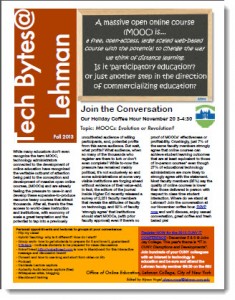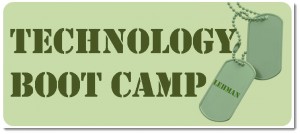This summer, Stefanie Havelka, Assistant Professor and the Electronic Resources-Web Services Librarian at Lehman College, visited Costa Rica to work with the library at the Monteverde Institute in Monteverde (MVI), Costa Rica. She worked with the library in increasing the number of local Costa Ricans’ access to and knowledge of relevant health topics via a community built digital health collection.
With its easy access to the rainforest, Monteverde is a popular ecotourism and research destination. The digital library project was started by Laurie Kutner, Associate Librarian from the University of Vermont, who had recognized the need to make locally produced research reports available for free online. In 2007, Marlene Leiton Cambell and Laurie Kutner, (who was at that time on sabbatical at the MVI Library) started the first Digital Library collection: MVI State of the Water Collection.
In summer of 2009, while a graduate student at the University of Syracuse, Havelka spent two months building the Community Health Digital library collection. Being actively involved in building a digital collection was an exciting project for Havelka, who was pursuing an Advanced Certificate in Digital Libraries. The Community Health Digital library collection uses locally produced research reports generated by graduate students enrolled in the Community Health course offered by two professors from the University of South Florida at the MVI each summer. The collection focuses on such topics as HIV, exercise, nutrition, mental health issues, and menopause.
The goal of this summer, and Havelka’s return visit, was to focus on outreach to the Monteverde community because many people weren’t aware of the services provided by the digital library. Strategies soon emerged to make the library more accessible to the public. First, brochures were created to address imperative health issues commonly faced by this population. These were simple, yet full of information for readers to comprehend and utilize. Additionally, there were bilingual tutorials on how to use the digital library. Doctors and nurses were taught how to use the library’s services in order to print out information for their patients as well as guide them in using the digital library.
Despite these improvements, Havelka had further goals but unfortunately didn’t have enough time. She realized that women’s needs in particular were not being met. In Costa Rican culture, women don’t necessarily have a voice in expressing their concerns. Havelka pointed out that in the United States, anyone, regardless of gender or sexual identity, can typically use the internet to research health issues, even before seeing a doctor. However, the internet is very expensive in Costa Rica compared to the U.S. (approx. $50-60 year out of an average income of $500). Havelka therefore proposed developing a special class for women, in which they could find and share general health education resources, via internet and other sources, by utilizing the digital library. While this is a positive beginning, she believes it is important to do more outreach and to get to know the Costa Rican women’s needs in Monteverde. You can visit the digital library here to get a sense of its progress and the accomplishments of those who worked on the project.
Havelka also provided advice for faculty working abroad. First, she suggested being extremely patient. Being in another country means learning about new cultures and their customs. In South America, the atmosphere is less hectic, and things may not get done as quickly as in other cultures. Therefore, being persistent yet respectful is a useful tactic in seeing projects through fruition. Also, Havelka encouraged obtaining grant money to pay for this type of work: most of her trip was paid out of her own pocket. Lastly, she recommended doing collaborative work for international projects because you can learn from others and incorporate insightful perspectives, as she did in working with with librarians from Maine, Vermont, and, of course, Costa Rica.


 upcoming faculty development workshops, “Essential Instructional Design for Faculty” (June 17-24) and “The Art of Feedback” (July 15-22). Each workshop is delivered entirely online and is 8-days in length. There are no real-time or face-to-face meetings required.
upcoming faculty development workshops, “Essential Instructional Design for Faculty” (June 17-24) and “The Art of Feedback” (July 15-22). Each workshop is delivered entirely online and is 8-days in length. There are no real-time or face-to-face meetings required.



